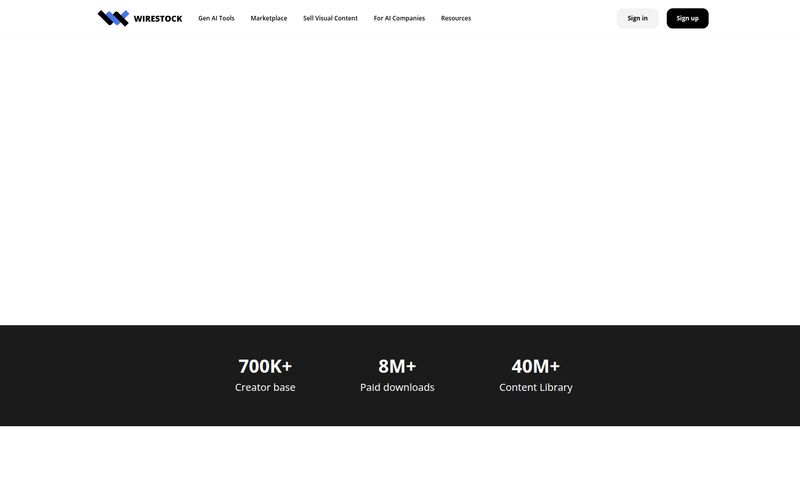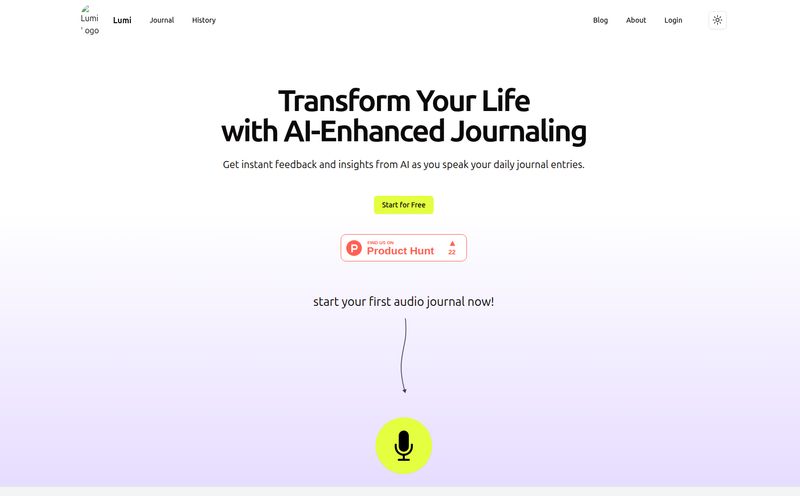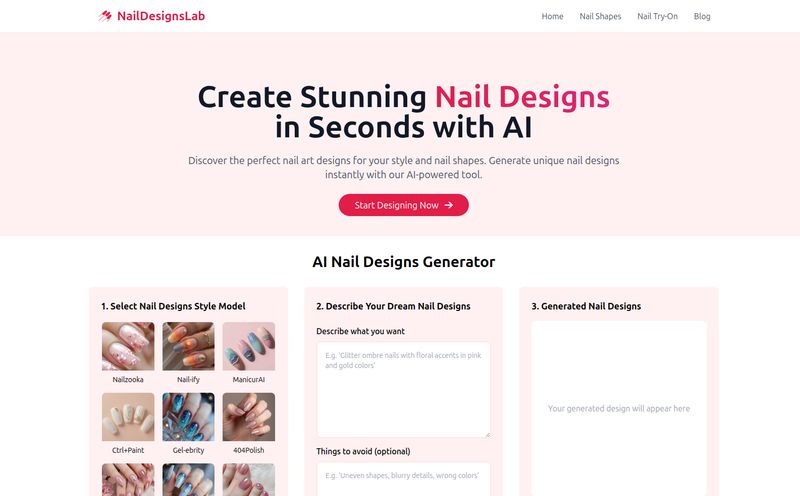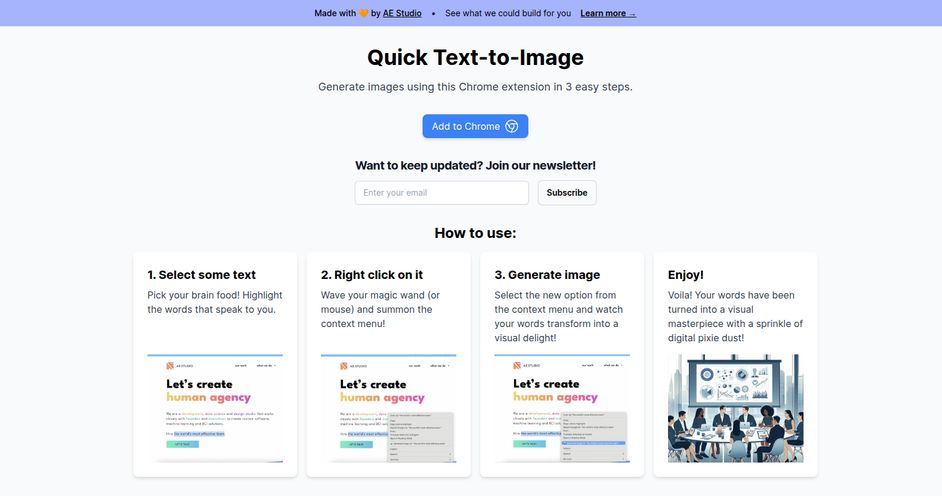As someone who's spent years eyeball-deep in analytics, CPC campaigns, and the relentless churn of content, I've seen my fair share of digital tools. Most are just slight variations of something that already exists. A new task manager, a slightly slicker keyword tracker... you get the picture. It's rare that something makes me genuinely stop and go, "Huh. Now that's... different."
And then SoulCanvas landed on my radar.
The pitch is simple, almost poetic: an AI-powered emotional wellness companion that turns your stories, your moods, your raw, unfiltered thoughts into unique pieces of art. It’s like having a surrealist painter on retainer, ready to interpret the tangled mess of your brain. Part journal, part art therapist, part social experiment. I’ve gotta say, my curiosity was piqued.
So, What Exactly is SoulCanvas?
Let's cut through the marketing jargon for a second. At its core, SoulCanvas is a platform where you input text—a journal entry, a fleeting thought, a memory, a dream—and its AI gets to work. It uses something they call mindREAD™ technology, which I suspect is a fancy name for some pretty sophisticated Natural Language Processing (NLP) trained to identify emotional sentiment, themes, and keywords.
But instead of spitting back a data chart of your emotional state (which, let's be honest, sounds dreadful), it generates a visual representation. A piece of art that’s meant to be a mirror to your inner world. Think of it less as a diary that locks with a key and more as a digital canvas that visualizes your soul. The idea is to foster self-discovery not just through writing, but through seeing your feelings reflected back at you in color and form.
How This AI Art Journaling Thing Actually Works
The process is incredibly straightforward. You write. You hit a button. You get art. From the looks of it, you can type, use your voice, or even capture a moment, and the AI takes it from there. The homepage gallery is a testament to the variety. I saw moody, ethereal landscapes captioned with introspective thoughts, vibrant abstract pieces born from moments of joy, and somber, darker works reflecting struggle.
Each creation is timestamped and saved to your personal art log, creating a visual timeline of your emotional journey. There’s also a social component, a “digital story platform” where you can share your creations with a community. It feels a bit like Instagram for your subconscious.

Visit SoulCanvas - AI Art Log
It’s an intriguing feedback loop. You express an emotion, the AI interprets and visualizes it, and in viewing the art, you might gain a new perspective on that original feeling. It's a dialogue with yourself, mediated by an algorithm.
The Good, The Bad, and The... Artsy
No tool is perfect, especially one trying to do something as ambitious as mapping human emotion. After looking through everything, here's my breakdown.
The Upside: More Than Just Pretty Pictures
The biggest win for SoulCanvas is its novelty. Journaling is powerful, but it can feel like a chore. Art therapy is effective, but it requires resources and can be intimidating. SoulCanvas sits in this fascinating middle ground. It lowers the barrier to creative expression. You don’t need to be able to draw a straight line to create something visually compelling that represents you. For anyone who's ever felt creatively blocked or struggled to put feelings into words, this could be a genuine breakthrough. The potential for building a supportive community around shared visual diaries is also quite powerful.
Some Potential Wrinkles in the Canvas
Now for the healthy dose of skepticism. First, privacy. You're feeding a platform your innermost thoughts. That requires a massive amount of trust. You'd need to be very confident in their data privacy and security policies before you get really honest. Second, can an AI truly interpret the nuance of human emotion? Sarcasm, irony, layered feelings... these are things humans struggle with. An AI might misinterpret a cynical rant as genuine sadness, creating art that feels alienating rather than insightful. And of course, art is subjective. What the AI generates might just not be your cup of tea, which could disrupt the whole therapeutic vibe.
Let's Talk Money: The SoulCanvas Pricing Plans
Okay, this is where things get a little weird for me. Given the personal wellness angle, I was expecting a freemium model or a simple, low-cost personal subscription. Instead, the pricing structure looks a lot more like a B2B SaaS product.
Here’s a quick look at the plans (billed monthly):
| Plan | Price (Monthly) | Key Features |
|---|---|---|
| Starter | $25 | 1 TB storage, Up to 5 apps and integrations, 2 collaborators |
| Deluxe | $70 | 50 TB storage, Up to 25 apps and integrations, 5 collaborators, Dedicated support |
| Professional | $120 | Unlimited storage, Unlimited apps and integrations, 12 collaborators, Dedicated support, Unlimited access |
There’s also a custom Enterprise plan. Notice the language? Collaborators. Advanced workflows. Integrations. This isn't typical for a personal journaling app.
So, Who is SoulCanvas Really For?
This pricing structure leads me to a different conclusion about their target audience. While it's marketed to the individual seeking self-discovery, the price points and features scream 'professional use case'.
My guess? SoulCanvas might be targeting therapists, life coaches, or wellness practitioners who can use the platform with their clients (the 'collaborators' feature makes perfect sense now, doesnt it?). Imagine a therapist assigning a client to journal in SoulCanvas, and then they can review the generated art together as a conversation starter in their next session. It could also be a fantastic tool for creative teams or content marketers looking for abstract visuals or inspiration based on thematic input. You could feed it brand manifestos or customer feedback and see what kind of art it inspires. From that perspective, the price suddenly makes a lot more sense.
For the average person just looking for a new way to journal, the $25/month entry point might feel a bit steep. But for a professional tool, it's pretty standard.
My Final Thoughts: A Tool with a Lot of Heart
SoulCanvas is one of the most interesting concepts I’ve seen in the AI space recently. It's an ambitious attempt to blend technology with the deeply human need for expression and understanding. It’s not just another AI art generator like Midjourney focused on creating the perfect prompt; it’s trying to create a connection.
Will it replace traditional therapy or journaling? No, and it shouldn't. But as a supplementary tool, a new lens through which to view ourselves? I think it has incredible potential. The slight identity crisis between being a personal wellness app and a professional B2B tool is something they'll need to clarify, but the core idea is undeniably compelling. It’s a beautiful, strange, and fascinating new frontier in our ongoing dialogue with technology and with ourselves.
Frequently Asked Questions
Is SoulCanvas a replacement for professional therapy?
Absolutely not. It should be seen as a tool for self-exploration and creative expression. While it may have therapeutic benefits and could be used alongside therapy (especially with its collaborator features), it is not a substitute for guidance from a qualified mental health professional.
How accurate is the AI's emotional interpretation?
This is one of the main subjective points. The AI uses advanced algorithms, but interpreting human emotion is complex. It's best to view the AI as an artistic partner rather than a perfect emotional analyst. It's meant to provide a different perspective, not an infallible diagnosis of your feelings.
Is my personal data kept private and secure?
Given the sensitive nature of the data shared, this is a critical question. Users should thoroughly review SoulCanvas's privacy policy and terms of service before use. A reputable platform in this space would use end-to-end encryption and have clear policies against sharing or selling personal data.
Who owns the art created by SoulCanvas?
This is a common question for all AI art generators. The answer usually lies in the platform's terms of service. Some platforms grant the user full ownership, while others retain some rights. For a paid service like this, one would hope the user retains commercial rights, but you must check the fine print.
Can I use SoulCanvas for my business or brand?
Based on the pricing structure and features like 'collaborators' and 'advanced workflows,' it seems designed for professional use. It could be an excellent tool for creative agencies, branding experts, or wellness professionals looking for new ways to generate ideas and engage with clients.
Reference and Sources
For further reading on AI, art, and mental health, you might find these resources interesting:
- The Role of Artificial Intelligence in Art Therapy - via NCBI
- The Rise of Generative AI Art - via Forbes



